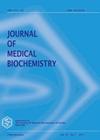炎症相关因素对地塞米松辅助治疗难治性化脓性脑膜炎患儿疗效的预测价值
IF 1.5
4区 医学
Q4 BIOCHEMISTRY & MOLECULAR BIOLOGY
引用次数: 0
摘要
目的:本研究旨在找出炎症相关因素对地塞米松辅助治疗难治性化脓性脑膜炎疗效的预测价值。 研究方法采用回归分析法,选取同期来丽水市青田县人民医院体检的38例难治性化脓性脑膜炎患儿、40例化脓性脑膜炎患儿和40例健康儿童作为研究对象,分为实验组、对照组和健康组。比较三组的炎症相关因素,并应用多元Logisitic回归分析地塞米松治疗难治性化脓性脑膜炎患儿的预测指标和预测疗效。 结果研究组CRP、TNF-α、IL-6、PCT和IL-1β高于对照组和健康组,对照组高于健康组(P<0.05)。多变量Logisitic回归分析明确了地塞米松治疗难治性化脓性脑膜炎患儿疗效的预测因子为CRP、TNF-α、IL-6、PCT和IL-1β,它们都具有良好的预测性能,其中CRP和IL-1β的预测性能更好。 结论炎症相关因子对地塞米松辅助治疗儿童难治性化脓性脑膜炎的疗效有一定的预测价值。本文章由计算机程序翻译,如有差异,请以英文原文为准。
Predictive value of inflammatory-related factors on the efficacy of adjuvant dexamethasone in the treatment of children with refractory suppurative meningitis
Purpose: The aim of this study was to figure out the predictive value of inflammatory-linked factors on the efficacy of dexamethasone adjuvant therapy for refractory suppurative meningitis in children. Methods: Using regression analysis method, 38 children with refractory purulent meningitis, 40 children with purulent meningitis, and 40 healthy children who came to Qingtian County People's Hospital of Lishui City for physical examination during the same period were selected as the research objects, and assigned into the experimental, the control and the healthy groups. The inflammation-linked factors in the three groups were compared, and multivariate Logisitic regression was applied to analyze the predictive indicators and predictive efficacy of dexamethasone treatment in children with refractory suppurative meningitis. Results: CRP, TNF-α, IL-6, PCT and IL-1β were higher in the study group vs. the control and the healthy, and in the control vs. the healthy (P < 0.05). Multivariate Logisitic regression analysis clarified the predictors of the efficacy of dexamethasone treatment in children with refractory suppurative meningitis were CRP, TNF-α, IL-6, PCT, and IL-1β, which all had good predictive performance, and among which CRP and IL-1β had better predictive performance. Conclusion: Inflammatory-linked factors have a certain predictive value for the efficacy of dexamethasone adjuvant therapy for refractory suppurative meningitis in children.
求助全文
通过发布文献求助,成功后即可免费获取论文全文。
去求助
来源期刊

Journal of Medical Biochemistry
BIOCHEMISTRY & MOLECULAR BIOLOGY-
CiteScore
3.00
自引率
12.00%
发文量
60
审稿时长
>12 weeks
期刊介绍:
The JOURNAL OF MEDICAL BIOCHEMISTRY (J MED BIOCHEM) is the official journal of the Society of Medical Biochemists of Serbia with international peer-review. Papers are independently reviewed by at least two reviewers selected by the Editors as Blind Peer Reviews. The Journal of Medical Biochemistry is published quarterly.
The Journal publishes original scientific and specialized articles on all aspects of
clinical and medical biochemistry,
molecular medicine,
clinical hematology and coagulation,
clinical immunology and autoimmunity,
clinical microbiology,
virology,
clinical genomics and molecular biology,
genetic epidemiology,
drug measurement,
evaluation of diagnostic markers,
new reagents and laboratory equipment,
reference materials and methods,
reference values,
laboratory organization,
automation,
quality control,
clinical metrology,
all related scientific disciplines where chemistry, biochemistry, molecular biology and immunochemistry deal with the study of normal and pathologic processes in human beings.
 求助内容:
求助内容: 应助结果提醒方式:
应助结果提醒方式:


